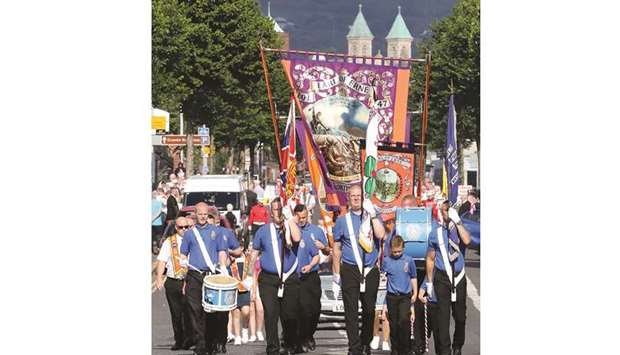Annual parades in Northern Ireland that frequently trigger sectarian violence began peacefully yesterday with little sign the British province’s political crisis is increasing tensions in volatile areas.
A power-sharing coalition between pro-British Protestant unionists and Irish Catholic nationalists collapsed in January but the protracted political impasse has not to date spiralled into renewed sectarian strife.
Annual marches have seen less violence since a 1998 peace deal ended three decades of sectarian fighting in which 3,600 people died, but traditional July and August marches are still seen as a barometer of inter-communal relations. Tens of thousands of mainly Protestant unionists, some wearing orange sashes and bowler hats began marching across the province early yesterday to the accompaniment of pipe bands.
The marches mark the 1690 victory by Protestant King William of Orange over Catholic King James at the Battle of the Boyne, which secured Protestant ascendancy in Britain and Ireland.
The sort of angry protests by nationalists, who want Northern Ireland merged with Ireland, that frequently greet the marches were nowhere to be seen, though the worst trouble tends to occur late in the evening. A morning unionist march past an Irish nationalist estate in North Belfast that has often been the scene of violence passed off without incident.
Marchers agreed to cancel the evening leg, which has frequently caused street clashes. The grand secretary of the Orange Order, which organises the marches, said there appeared to be less tension this year.
“We took a deliberate decision last year not to issue statements about parades so that would not increase tensions. I believe that paid off,” Mervyn Gibson told the BBC.

Bands take part in the annual July 12 parade in Belfast, yesterday. July 12 is the main marching day in the Orange Order calendar.
